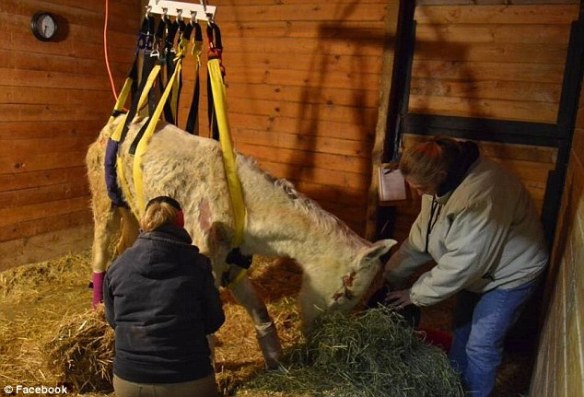
Elsa standing and eating with the help of a sling. Her ordeal finally overwhelmed her, and she died at the weekend.
SEE CALL TO ACTION BELOW
LADD EGAN reports:
KUTV (Jan. 22, 2014) — An animal cruelty case in Southern Utah involving a young horse dying after being found frozen to the ground has garnered nationwide attention and calls for Utah to enhance its laws to protect horses.
“We want the law to change,” said Ginger Grimes, founder of the Dust Devil Ranch Sanctuary for Horses in Iron County. “We’re not going to let it rest.”
Animal control officers rescued the emaciated filly and her mother from the backyard of a home in Enoch City on Jan. 2 and took them to the nearby horse sanctuary.
“This is absolutely one of the worst cases in my career,” said animal control officer Chris Johnson.
The sanctuary named the 21-month-old filly “Elsa” and the 10-year-old mare “Anna.” Volunteers worked around the clock to nurse them back to health. But it soon became clear that Elsa would not make it. She died on Jan. 18.
“We did everything we could possibly do,” Grimes said, adding that Elsa died surrounded by her caregivers. “It was silent and she took her last breath.”
Enoch police charged the owner of the horse with animal cruelty, a class “B” misdemeanor. As news of Elsa’s death spread on social media, many have called for tougher felony charges saying the punishment doesn’t fit the crime.
“He didn’t feed this horse; it’s blatant,” Grimes said. “It’s not like he had to go 25 miles away to feed it.”
Enoch’s police chief says his department understands demands for stiffer charges and says the case has been upsetting for his department as well.
“We want to see justice served just as much as anybody else,” Chief Jackson Ames said. “But we can’t go above and beyond what the law allows either.”
Ames said Utah’s laws on animal cruelty do not classify horses as companion animals, making it so that enhanced charges and penalties are not available in this case.
“No animal should have to go through this experience and suffer like it did,” Chief Ames said. “If people want to champion this cause and try and get the law changed, I encourage that.”
The Daily Mail reports that a ranch dog named Dingo never left the filly’s side. The dog was still present when Elsa died at 4:30 p.m. on Saturday afternoon. The filly’s mother, named Anna, is recovering well, and was brought in to spend one last moment with Elsa.
Sanctuary founder Ginger Grimes said a “body imprint where you can see every hair strand” remains where Elsa lay for “quite some time”.
The sanctuary is working with animal advocacy groups and the Iron County Sheriff’s Office to spread word to horse owners that if they are struggling to afford caring for their horses, help is available.
WHAT YOU CAN DO
Please take the following action:
Utah Residents
– If you are a Utah resident, please contact your State Representative and Senator.
:: Find Your State Representative — http://le.utah.gov/house2/index.html
:: Find Your State Senator — http://www.utahsenate.org/
:: Find Your State Senator — http://www.utahsenate.org/
– Write also to Sen. Wayne Niederhauser, President of the Utah State Senate.
:: He has an email webform here.
:: He has an email webform here.
All
– No matter where you reside, please contact the Office of the Utah State Attorney General’s Office and the Governor of Utah.
- Office of the Attorney General,
Sean D. Reyes
Utah State Capitol Complex
350 North State Street Suite 230
Salt Lake City, UT 84114-2320
Governor Gary R. Herbert
Utah State Capitol Complex
350 North State Street, Suite 200
PO Box 142220
Salt Lake City, Utah 84114-2220
Utah State Capitol Complex
350 North State Street, Suite 200
PO Box 142220
Salt Lake City, Utah 84114-2220
Express your feelings about the abuse and death of Elsa, the Utah filly starved and left to die outside, found frozen to the ground.
1. Ask the Attorney General to work with State legislators to strengthen equine protection laws so that the punishment fits the crime and acts as a deterrent.
2. Ask the Attorney General to establish an animal cruelty database. This is very important information for law enforcement and not just for animals. People who commit acts of violence and murder often have a history of animal abuse.
3. Repeat to the Governor of Utah.